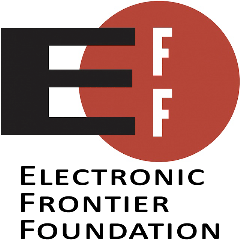
The Electronic Frontier Foundation is a nonprofit, donor-funded international organization based out of San Francisco, California with offices also located in Washington, D.C. It is a principal partner of the Global Network Initiative and is an accredited observer at the World Intellectual Property Organization. The EFF has been classified as a digital rights advocacy group, and was formed in July of 1990 by John Gilmore, an employee of Sun Microsystems, John Perry Barlow, lyricist for the Grateful Dead, and Mitch Kapor, the former president of Lotus Development Corporation.[1]
EFF Goals[edit | edit source]
The main goal of EFF is to raise awareness of the issues involving civil liberties in a new digital communications media. This involves the open support of litigation in the public interest to protect and advance the rights laid out in the First Amendment of the United States Constitution and apply those rights directly to the field of digital media. The organization contributes funding for the legal defense of individuals and new technologies against cases that the organization believes are based on baseless or misleading legal threats. The Foundation supports technologies which it believes would promote individual freedoms, and challenges any legislation that is considered by the EFF as an infringement on fair use and personal libertie.s[2][3]
EFF Supporters[edit | edit source]
The Electronic Frontier Foundation is sustained through donations from both the private and public sector. The bulk of support is supplied by the organizations board members, however a considerable amount of funding is provided by the private sector as well.[4]
Notable Legal Cases[edit | edit source]
Apple v. Does[edit | edit source]
This case involved a lawsuit filed by Apple Computers against several unnamed individuals, "Does", who were accused of leaking information regarding an upcoming product on the news sites AppleInsider and PowerPage. During the investigation Apple subpoenaed Nfox, the email service provider for PowerPage, for all unpublished materials and communications obtained by the PowerPage publisher Jason O'Grady. EFF defended the journalists and a California state appeals court determined that they were protected under California's reporters shield law. The court also ruled that the subpoena by Apple against Nfox violated the Stored Communications Act and was therefore unenforceable.[5]
Bernstein v. US Department of Justice[edit | edit source]
In 1995, a researcher named Dan Bernstein developed a program to make it harder for strangers to view private information, such as passwords or credit card numbers. The distribution of this program was restricted by the federal government, who claimed that these privacy protectors were a threat to national security. EFF sued the government on Bernstein's behalf, at which point a federal court confirmed that First Amendment protection applies to software code.[6]
EFF Projects[edit | edit source]
Bloggers Rights[edit | edit source]
A legal guide for bloggers that has a collection of blogger related questions and answers, everything from defamation law to fair use to workplace whistle-blowing.[7]
Transparency Project[edit | edit source]
This project is dedicated to insuring that the federal government upholds the civil liberties of its citizens by doing their best to shine a light on all government activities. This is achieved by way of courtroom actions and the use of federal and state freedom of information laws.[8]